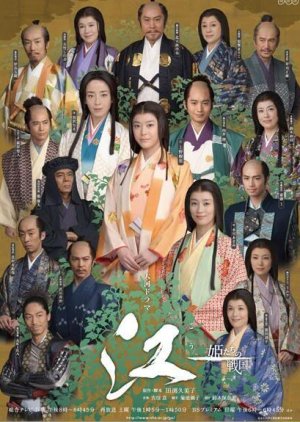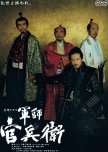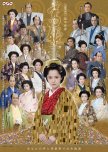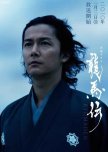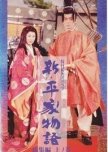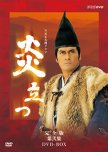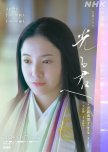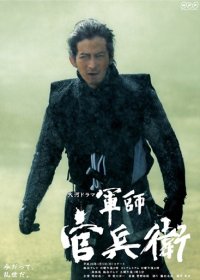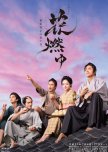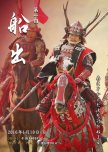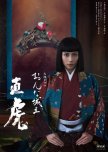
But I must say that I was really impressed by this drama!
When I am bored by a drama I usually skip some parts but this drama here made me so addicted ,that I didn´t want to stop watching it.I watched the first 10 episodes and then I always contined to wait exited for the next episode :D You never know what will happen next and it really moves your feelings.In the first moment you must cry and the next moment you just laugh out loud! Even though it isn´t a comedy,the Cast in the drama is performing really exeptionally.You can perfectly understand their point of view and because the story is based on a true story, it feels even more real.
For the plot;
Basically the story is about a princess who is used from the birth for political matters but in the end she becomes the wife of the Shogun whom she really loves.This drama shows her strong personality and how she fought through her life until she finally found happiness ;)
I can only recommend it for everyone who wants to learn of the japanese history and who wants to see an exeptionally played drama with outstanding actors! Even when someone might don´t prefer watching historical dramas , it is worth the lenghts of 47 episodes
Esta resenha foi útil para você?

Anyway, moving on. Gou was a nice break from the idol dramas as of recent, an account of the Sengoku Era told from a woman's point of view. Considering that women were of low statuses then, the effect that women had on men in this drama seems a little surreal. However, it's a nice and refreshing change from watching a period drama where men are always involved in war.
This drama recounts the life of Gou, the wife of the 2nd Tokugawa Shogun, Tokugawa Hidetada. It recounts her love life, her dedication and believe in her husband. She must've been one of the luckiest women in the Sengoku Era-- her husband never took a concubine (but had some illegitimate children along the way) and her husband was just so... dedicated to her, but maybe I'm just infatuated with Mukai Osamu's role... HE'S TOO DREAMY FOR WORDS *_* Unfortunately, Ueno Juri was a miscast. She acted her part really well, her role was rather convincing, but somehow... something didn't seem right. I can't put my finger on it but in Nodame, she had such a distinctive charm and personality, but in this, she portrayed the role too... intensively? Her words, her expression, they seemed too forced. Perhaps, but I'm not sure. Nevertheless, she put in a great amount of effort, but I will not rewatch this drama, who rewatches period dramas? Too many episodes for me to handle, I feel :(
Overall, this drama was a breeze to watch. It wasn't heartbreaking, it didn't make me angry, and it wrapped up nicely; the ending was just pretty and complete. And Mukai!! Mukai is my all-time favourite, his voice is so deep and baritone ahhhhhh *___*
Esta resenha foi útil para você?

The major flaw is having 20 something year old actors playing kids 7 to 10 year old. That... let's try to forget about it. Also Gou was definitely overstated in the events in the first, say 13-15 episodes of the drama, which is weird since, once adult, she didn't appear to me as not submissive to everything that happened to her. That is not to say that is a weakness of the drama.
This drama is about the hardships women of that era go through, their pain and suffering, and their inability to do much. They try the best they can but once war breaks, all they can do is pray for their loved ones. I think this drama succeeded in portraying that to me. The weird thing about it though, which made feel a bit uneven, is how the beginning has quite some whitewashing of certain historical figures and events, and how in the 2nd half of the drama, they were pretty much frank about the harshness of their realities. In general, this drama started succeeding in my eyes the moment it stopped taking liberties in history and started presenting us things are they are, as much as possible.
Ueno Juri was amazing in that role, and so was Osamu Mukai. One highlight is Miyazawa Rie as Chacha, the transformation of her character was marvelous. I was afraid Mizukawa Asami would ruin the drama for me but she didn't. I think as a character I liked her most, but the actress was a bit lacking in some emotional scenes. Still overall I think I can come to term with that actress. I think my favourite though was Kitaoji Kinya as Tokugawa Ieyasu. He was perfect in portraying such a cunning man, though at times hateful but overall a great leader. He managed to make me understand such a historical figure and why he did the things he did. I also loved Suzuki Honami as their mother, and her voice as the Narrator.
I gotta say, I love the choice of music used here in the drama. It's nothing too noticeable, just perfect in the background, either emphasizing on the feelings of the characters, or bringing us from one point to another.
As flawed as the drama is, it is still a splendid and enriching ride. Do give it a try if you are curious of the state of women in the warring are. The Azai sisters and their mother are the perfect example to represent the generation, but we see the hardship and strength to live of many of the women around them as well.
Esta resenha foi útil para você?

The story focused on the three sisters of the Azai clan. They were related to Oda Nobunaga through their mother side. The three sisters will marry into 3 different families and were involved in one of the greatest battles in Japan history. Women at the warring state era of Japan lived in a harsh life. Go being the youngest of three sisters and the main focus had to face many trials. In the future, she will be the shogun's official wife as well as the mother in law of the emperor.
Esta resenha foi útil para você?

In my opinion Gou is lacking in that aspect during the first half of the series, resulting in non-consistent characters writing in the second half. However it managed to cautiously being truthful to history, especially after the death of Hideyoshi (around Ep31).
Over writing the child character of Gou was the worst thing I have ever seen in Taiga Drama. Some exaggeration is forgivable, but writing non-logical child actions and reactions is a fatal mistake for a professional writer.
Furthermore, some important characters have been sugarcoated to make them appeal more to audience, while few others were overlooked and didn't get proper writing, namely Ishida Mitsunari, O-ne and Chacha.
All in all, this is definitely not the best Taiga Drama as a whole. But it is watchable if you could close eyes on Gou's childhood story arc.
Esta resenha foi útil para você?

Esta resenha foi útil para você?

Acting (on the womens part) was okay but not the best.
Too long as well, especially with it being about a woman's journey (not being sexist but for the time period it all happened it, wasn't the best story to pick).
Nevertheless, there were some parts I was emotional (certain male characters deaths) and some parts were good, just wish it hadn't been focused on the sisters and more on the males - but then it wouldn't have been Gou ~ Himetachi would it? haha xD
Esta resenha foi útil para você?

